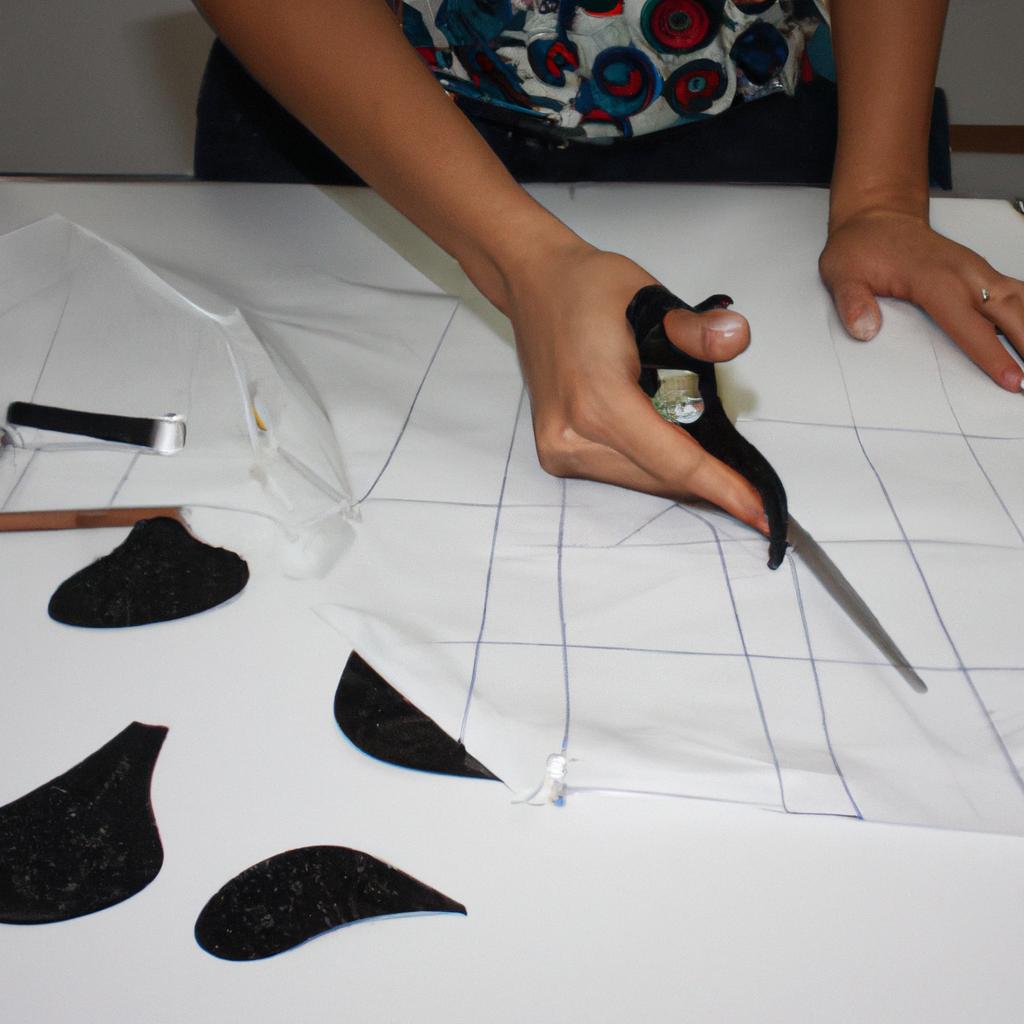The arts and television industry has long been a platform for creativity, innovation, and entertainment. However, the financial challenges that artists and producers face can often hinder their ability to bring their visions to life. This article aims to provide a comprehensive guide on various forms of financial assistance available in the realm of arts and television, empowering individuals with knowledge and resources to overcome these obstacles.
Consider the example of Sarah, a talented filmmaker with limited funds but boundless ambition. She dreams of producing her first feature film, showcasing her unique storytelling skills to captivate audiences worldwide. However, Sarah finds herself grappling with the daunting task of securing adequate funding for this venture. It is at such crossroads where understanding the different avenues for financial assistance becomes crucial; it opens doors to opportunities that may have otherwise seemed unattainable. By exploring grants, sponsorships, loans, and other mechanisms discussed within this guide, aspiring artists like Sarah are equipped with valuable insights into navigating the complex landscape of monetary support in arts and television industries.
In an increasingly competitive market driven by technological advancements and changing consumer preferences, being aware of potential sources of financial aid can make all the difference between realizing artistic aspirations or abandoning them altogether. With this ultimate guide as a compass pointing towards solutions tailored specifically for their needs, artists and producers can forge ahead with confidence, knowing that there are options available to help bring their creative visions to life.
Grants are one of the most common forms of financial assistance in the arts and television industries. These grants can be obtained from various sources such as government agencies, foundations, and art organizations. They provide funding for projects ranging from film production to art exhibitions, allowing artists like Sarah to pursue their passion without the burden of financial constraints. It is important for individuals to research and identify grant opportunities that align with their specific artistic goals and submit well-crafted proposals to increase their chances of success.
Sponsorships are another viable avenue for financial aid in the arts and television sectors. Companies and brands often seek partnerships with artists or productions that align with their values or target audience. By securing a sponsorship deal, artists can gain access to financial resources, promotional support, and exposure to wider audiences. Building relationships with potential sponsors requires networking skills, strong pitches, and a clear understanding of how the partnership can be mutually beneficial.
Loans can also play a significant role in financing artistic endeavors. Traditional banks or specialized lenders may offer loans tailored specifically for creative professionals. These loans typically have favorable terms designed to accommodate the unique challenges faced by artists and producers. However, it is essential for borrowers to carefully assess the terms and conditions of any loan agreement before committing to ensure they can meet repayment obligations without compromising their artistic vision.
Crowdfunding has emerged as a popular alternative form of financing in recent years. Platforms like Kickstarter and Indiegogo allow artists to raise funds directly from supporters who believe in their work. This method not only provides financial assistance but also creates a sense of community around the project while building an engaged fan base.
In addition to these avenues discussed above, there are other lesser-known forms of financial assistance available such as residencies, fellowships, and artist-in-residence programs offered by institutions or organizations. These opportunities often provide artists with financial support, access to resources, and dedicated time to focus on their creative pursuits.
By understanding the various forms of financial assistance available in the arts and television industries, artists like Sarah can navigate the complex landscape of funding options. Armed with this knowledge, they can confidently pursue their artistic endeavors, secure in the knowledge that there are avenues to help them overcome financial barriers and bring their visions to life.
Grants for Arts and Television Programs
Imagine a struggling independent filmmaker named Sarah, who dreams of turning her passion into a successful career in the arts and television industry. However, she faces financial barriers that hinder her progress. This is where grants come to the rescue, providing much-needed support for individuals like Sarah to pursue their creative endeavors.
Grants are non-repayable funds awarded by organizations or institutions to artists and television professionals based on specific criteria such as artistic merit, project scope, or societal impact. These funds can cover various aspects of arts and television programs, including production costs, research expenses, equipment purchases, and travel fees. By receiving grant funding, individuals can focus on honing their craft without being burdened by financial limitations.
To better understand the significance of grants in supporting arts and television programs, let’s explore some compelling reasons why they play a vital role:
- Grants foster creativity: By alleviating financial constraints, grants enable artists and television professionals to fully immerse themselves in their work. This freedom allows them to explore innovative ideas and take risks that might not be possible otherwise.
- Grants promote diversity: The availability of grants encourages individuals from diverse backgrounds to participate in the arts and television industry. This inclusivity ensures that different perspectives are represented both behind and in front of the camera.
- Grants empower emerging talents: For aspiring artists and TV professionals with limited resources, grants provide a platform to showcase their skills and gain recognition within the industry. They offer opportunities for networking, mentorship, and exposure essential for career growth.
- Grants drive social change: Many granting organizations prioritize projects that address social issues or contribute positively to society. Through these initiatives, grants facilitate storytelling that raises awareness about important topics while fostering empathy among audiences.
| Grant Type | Eligibility | Funding Amount | Application Deadline |
|---|---|---|---|
| Film Production | Independent filmmakers working on a specific project | Up to $50,000 | May 15th, 2022 |
| TV Development | Established production companies creating new concepts | Up to $100,000 | August 1st, 2022 |
| Arts Education | Non-profit organizations offering arts education programs | Varies | Rolling basis |
| Digital Media | Individuals or groups developing innovative digital projects | Up to $20,000 | November 30th, 2022 |
As shown in the table above, grants for arts and television programs come in various forms catering to different funding needs. Whether you are an independent filmmaker like Sarah or an established production company aiming to develop groundbreaking TV series, there is likely a grant that aligns with your aspirations.
These educational awards not only provide financial support but also offer valuable opportunities for personal and professional growth within the industry.
Scholarships for Aspiring Artists and TV Professionals
From the world of Grants for Arts and Television programs, we now turn our attention to scholarships that provide financial assistance to aspiring artists and TV professionals. Let’s explore some opportunities available in this realm.
Imagine a young artist named Emily who dreams of pursuing a career in television production. Despite her talent and passion, she lacks the necessary funds to pursue formal education or training. In such cases, scholarships can be a ray of hope, helping individuals like Emily fulfill their artistic aspirations. These scholarships are often awarded based on merit, need, or a combination of both.
When it comes to scholarships for arts and television professionals, there are various options worth considering:
- Merit-based Scholarships: These scholarships recognize exceptional talent and skill in one’s chosen field. They may require applicants to submit portfolios showcasing their work or demonstrate outstanding academic achievement.
- Need-based Scholarships: Designed to assist students from disadvantaged backgrounds, these scholarships take into account an individual’s financial situation when awarding funding. Applicants typically need to provide documentation demonstrating their financial need.
- Industry-specific Scholarships: Some organizations within the arts and television industry offer scholarships specifically tailored to support those interested in pursuing careers within their respective fields. Examples include film studios offering scholarships for aspiring filmmakers or broadcasting networks supporting journalism students.
- Diversity-focused Scholarships: Organizations dedicated to promoting diversity and inclusivity often provide scholarships targeted at underrepresented groups in the arts and television sectors. These initiatives aim to increase representation by providing financial aid to individuals from diverse backgrounds.
To further illustrate the range of scholarship opportunities available, let’s take a look at the following table:
| Scholarship Name | Eligibility Criteria | Application Deadline |
|---|---|---|
| Artistic Excellence Scholarship | Outstanding portfolio submission | May 15th |
| Financial Needs Support Grant | Demonstrated financial need | Rolling basis |
| Women in Film Scholarship | Female students pursuing film studies | March 1st |
| Diversity in Journalism Award | Underrepresented minority students | June 30th |
These Scholarships not only provide financial assistance to deserving individuals but also contribute to fostering diversity and excellence within the arts and television industries. By supporting talented artists and TV professionals who may face barriers due to financial constraints, these scholarships help nurture a thriving creative community.
As we delve into the topic of fellowships for arts and television students, it becomes evident that numerous opportunities exist beyond grants and scholarships. These programs offer aspiring artists and TV professionals unique experiences, mentorship, and resources to further enhance their skills. Let’s explore these exciting prospects in the next section.
Fellowships for Arts and Television Students
Transitioning from the previous section, where we discussed scholarships available to aspiring artists and TV professionals, let us now explore another form of financial assistance in the arts and television industry – grants for arts and television projects. To illustrate this further, consider the case study of an emerging filmmaker named Sarah.
Sarah was a passionate filmmaker who had recently completed her first short film. She believed that her work had potential but lacked the necessary funds to bring it to a wider audience. Determined to find support, she applied for various grants aimed at funding independent film projects. Through diligent research and meticulous applications, Sarah secured a grant that provided her with not only financial aid but also mentorship opportunities and exposure within the industry.
Grants can be an invaluable source of support for individuals like Sarah looking to finance their creative endeavors in arts and television. Here are some key benefits associated with grants:
- They provide monetary assistance without requiring repayment.
- Grants often come with additional resources such as mentorship programs or networking opportunities.
- Successful applicants gain recognition and visibility within their respective fields.
- Grant-funded projects contribute to the growth and diversity of artistic expressions in society.
To highlight different types of grants available, below is a table summarizing four notable options along with their respective focus areas and award amounts:
| Grant Name | Focus Area | Award Amount |
|---|---|---|
| Artistic Vision | Visual Arts | $10,000 |
| Storyteller’s | Film Production | $15,000 |
| Innovators | Digital Media | $7,500 |
| Creative Minds | Performing Arts | $12,000 |
These examples demonstrate how diverse grant opportunities exist across various artistic disciplines, catering to different project needs. Artists and TV professionals should thoroughly research relevant grant programs aligned with their specific goals.
In considering grant applications, it is crucial to adhere to the guidelines and deadlines set by each funding organization. Furthermore, submitting a compelling project proposal that aligns with the objectives of the grant can significantly increase one’s chances of receiving financial support.
With grants serving as an instrumental means for artists and TV professionals to bring their projects to life, we will now delve into other options available for educational funding in the arts and television industry. By exploring these avenues, individuals can further enhance their skills and pursue meaningful careers within these creative fields.
Options for Educational Funding in the Arts and Television Industry
Having explored fellowships available to arts and television students, let us now delve into the various options for educational funding within this dynamic industry. By understanding these opportunities, aspiring artists and television professionals can better navigate their financial journey towards achieving their creative goals.
To illustrate the possibilities that lie ahead, consider the case of Sarah, a talented art student with dreams of pursuing a career as a professional painter. Despite her passion and dedication, Sarah faces challenges when it comes to financing her education. Fortunately, there exist several avenues through which individuals like Sarah can seek support:
- Scholarships: Many organizations offer scholarships specifically designed to assist arts and television students. These scholarships are often merit-based or awarded based on specific criteria such as artistic ability or academic achievement.
- Grants: Government agencies, private foundations, and nonprofit organizations provide grants that are instrumental in supporting arts and television education. These grants may cover tuition fees, living expenses, research materials, or project costs.
- Work-Study Programs: Some educational institutions offer work-study programs where students can earn income while gaining valuable experience related to their field of study. This option allows students like Sarah to contribute financially towards their education while simultaneously building connections within the industry.
- Crowdfunding Platforms: In recent years, crowdfunding has emerged as an alternative means of securing funds for artistic projects. Artists can create campaigns on platforms such as Kickstarter or Patreon, reaching out to a global audience who believe in their creative vision.
- Financial Assistance enables dedicated individuals to pursue their passion without being hindered by monetary constraints.
- Accessible scholarships empower deserving candidates who might otherwise face financial barriers to education.
- Grants provide artists and television professionals the opportunity to explore their craft without the burden of excessive debt.
- Work-study programs foster a practical learning environment, allowing students to gain hands-on experience while financing their education.
Emotional Table:
| Financial Support Options | Benefits |
|---|---|
| Scholarships | Merit-based assistance |
| Grants | Coverage for tuition fees, living expenses, and project costs |
| Work-Study Programs | Opportunity to earn income while gaining industry-related experience |
| Crowdfunding Platforms | Global outreach potential for funding artistic projects |
As aspiring arts and television professionals navigate their educational pursuits, it is crucial to be aware of these options that can ease their financial burdens. By utilizing scholarships, grants, work-study programs, or crowdfunding platforms like Sarah did in our case study example, individuals can turn their creative aspirations into reality.
With an understanding of the various funding avenues available within the arts and television industry, let us now explore specific Financial Support Programs aimed at assisting individuals pursuing education in this field.
Financial Support Programs for Arts and TV Education
Having explored the various options for educational funding in the arts and television industry, it is important to now turn our attention towards financial support programs specifically designed to aid aspiring artists and TV professionals. To illustrate the effectiveness of such programs, let us consider a hypothetical case study.
Case Study:
Meet Sarah, a talented young artist with dreams of pursuing a career in television production. Despite her passion and dedication, Sarah’s financial constraints pose a significant hurdle on her path to success. However, through diligent research and perseverance, she discovers several financial support programs that provide much-needed assistance.
Financial Support Programs for Arts and TV Education:
-
Scholarship Opportunities:
- Scholarships aimed at supporting students interested in arts and television.
- These scholarships often cover tuition fees partially or even fully.
- Application requirements may include academic achievements, portfolio submissions, or interviews.
- Institutions and organizations offering such scholarships include XYZ Foundation and ABC University.
-
Grants for Artistic Development:
- Grants provided by government agencies, non-profit organizations, or artistic foundations.
- Designed to fund specific projects or help individuals enhance their skills within the art and television industries.
- Application processes typically involve project proposals outlining goals, budgets, and expected outcomes.
- Notable grant providers include DEF Agency and GHI Fund.
-
Financial Aid from Educational Institutions:
- Many universities offer need-based financial aid packages tailored to arts and television students.
- This can include grants, work-study opportunities, or loans with favorable terms.
- Students should explore available resources within their chosen institutions’ financial aid offices.
- Overcoming financial barriers enables talented individuals like Sarah to pursue their passion without compromise.
- Financial support programs reflect society’s recognition of the importance of fostering creativity in arts and television fields.
- Accessible funding options create equal opportunities for aspiring artists regardless of their socio-economic background.
- Successful beneficiaries of financial support programs contribute to the vibrancy and diversity of the arts and television industry.
Emotional Table:
| Financial Support Programs | Benefits |
|---|---|
| Scholarships | – Reduced financial burden- Encouragement for talented individuals- Recognition of achievements |
| Grants | – Funding for artistic projects or skill development- Opportunities for professional growth- Validation of creative potential |
| Educational Institution Aid | – Need-based assistance tailored to students’ circumstances- Accessible resources within educational institutions- Alleviation of financial stress |
With these various financial support options available, it is evident that aspiring artists and TV professionals can find substantial aid in pursuing their education. In the subsequent section, we will explore how individuals can seek assistance specifically with tuition fees in arts and television studies.
Assistance with Tuition Fees in Arts and Television Studies
Case Study: Sarah, a passionate aspiring actress, dreamt of pursuing a career in the television industry. However, she faced financial constraints that seemed to hinder her educational journey. Fortunately, there are various financial support programs available to assist individuals like Sarah in pursuing their artistic aspirations.
One such program is the Artist Trust Grants offered by the Artist Trust Foundation. This grant provides financial assistance to artists across different disciplines, including visual arts, performing arts, media arts, and literary arts. Artists can apply for funding to cover project costs, professional development opportunities, or general living expenses while focusing on their craft.
To further illustrate the range of financial assistance options available, consider these emotional bullet points:
- Accessible funds that alleviate financial burdens
- Empowering creative individuals to pursue their dreams
- Encouraging diversity and inclusivity within the arts community
- Providing equal opportunities regardless of socioeconomic background
The following table showcases additional organizations and institutions offering grants and scholarships specifically tailored towards supporting education in arts and television:
| Organization | Scholarship Name | Eligibility | Application Deadline |
|---|---|---|---|
| Television Academy Foundation | College Television Awards | Full-time undergraduate students | February 15 |
| National Endowment for | NEA Literature Fellowships | Published writers | Varies |
| the Arts | |||
| American Theatre Wing | Andrew Lloyd Webber Initiative | Public high school theater educators/students | March |
These examples highlight just a fraction of the numerous programs available. By exploring different opportunities, students can find suitable sources of financial aid that align with their goals and interests.
Transitioning into Loan Programs for Arts and Television Students…
Loan Programs for Arts and Television Students
Moving on to other forms of financial assistance available in the field of arts and television studies, let us now explore loan programs that can help aspiring students pursue their dreams.
To illustrate the impact of loan programs, consider a hypothetical case study involving Emily, an ambitious student passionate about pursuing a career in acting. Despite her talent and dedication, Emily faces financial constraints that make it challenging for her to afford tuition fees and related expenses. Fortunately, she discovers several loan programs specifically tailored to support arts and television students like herself.
These loan programs offer various benefits designed to alleviate the burden of educational costs. Here are some key advantages:
- Flexible repayment options: Loan providers understand the unpredictable nature of careers in the arts and television industry, offering borrowers flexibility in repaying their loans based on their income levels.
- Competitive interest rates: To ensure affordability and accessibility, these loan programs often provide competitive interest rates compared to traditional bank loans.
- Expedited application process: Recognizing the urgency faced by students seeking immediate financial aid, many loan programs have streamlined application processes with quick approval turnaround times.
- Additional resources: Some loan programs may also offer additional resources such as mentorship opportunities or networking events within the industry, providing valuable guidance and connections for future success.
Table representing different types of Loan programs:
| Loan Program | Interest Rate | Repayment Terms |
|---|---|---|
| Act Now Loans | 3.5% – 6% | Income-based |
| Star Scholar | 4% – 7% | Graduated repayment |
| Creative Fund | 2.9% – 5.5% | Standard repayment |
| Visionary Loan | 3% – 6.5% | Extended repayment |
Through these innovative loan programs, individuals like Emily gain access to the necessary funds to pursue their education in arts and television. By providing financial relief and valuable resources, these programs empower students to focus on honing their skills and achieving their career aspirations.
With loan programs discussed, let’s now delve into other forms of financial aid available for aspiring artists and TV professionals.
Financial Aid for Aspiring Artists and TV Professionals
Imagine a young artist named Sarah, who dreams of pursuing a career in television production. However, she faces the challenge of financing her education and training in this competitive industry. Fortunately, there are various financial assistance options available to help individuals like Sarah achieve their artistic aspirations.
One avenue that aspiring artists and TV professionals can explore is scholarships. These merit-based awards provide funding based on an individual’s talents, achievements, or potential. For instance, the Television Academy Foundation offers scholarships to students pursuing degrees related to television and media disciplines. This support enables talented individuals to access quality education without worrying about the burden of tuition fees.
In addition to scholarships, grants also play a crucial role in providing financial aid for arts and television students. Grants are typically awarded by organizations or institutions with specific interests in supporting creative endeavors. They offer funds that do not need to be repaid, allowing recipients to focus entirely on their studies or professional development. Whether it’s through government agencies, private foundations, or art-focused associations, these grant opportunities can alleviate financial constraints while nurturing artistic growth.
To further assist aspiring artists and TV professionals financially, some educational institutions have established work-study programs tailored specifically for creative fields. Through such initiatives, students can gain practical experience while earning money to offset their educational expenses. By integrating academics with real-world scenarios within the arts and television industries, these programs equip students with valuable skills while alleviating financial burdens simultaneously.
The pursuit of an artistic career requires dedication and commitment; however, financial obstacles should not deter talented individuals from chasing their dreams. Scholarships, grants, and work-study programs offer invaluable support for those passionate about arts and television—unlocking doors that might otherwise remain closed due to limited resources.
Looking ahead at Opportunities for Funding Arts and Television Education
Opportunities for Funding Arts and Television Education
Building on the previous section’s exploration of financial aid options for aspiring artists and TV professionals, it is essential to consider additional opportunities available to support individuals pursuing arts and television education. This section will delve into various avenues that can offer much-needed assistance in funding one’s educational journey.
To illustrate the possibilities, let us consider a hypothetical scenario where Sarah, an ambitious artist with a passion for television production, is seeking financial aid for her studies. Sarah faces numerous challenges such as high tuition fees and limited access to resources. However, she discovers several sources of financial assistance specifically tailored to students like herself:
-
Scholarships: Many institutions offer scholarships based on artistic talent or academic achievement. These scholarships not only provide financial support but also recognize exceptional abilities in the field of arts and television.
-
Grants: Numerous organizations provide grants to talented individuals aiming to pursue education in the arts and television industry. These grants often focus on specific areas within these fields, such as scriptwriting or cinematography, enabling students to develop their skills further.
-
Work-Study Programs: Some universities offer work-study programs that allow students to gain practical experience while earning money to contribute towards their education expenses. These programs create a valuable opportunity for students like Sarah to balance both academics and professional growth.
-
Crowdfunding Platforms: In recent years, crowdfunding platforms have emerged as powerful tools for artists and TV enthusiasts looking to fund their education or creative projects. By leveraging social networks, individuals can connect directly with potential supporters who share their passion and are willing to invest in their success.
| Financial Assistance Options | Description |
|---|---|
| Scholarships | Recognize outstanding artistic talents or academic achievements; provides monetary support along with recognition |
| Grants | Offered by organizations focusing on different aspects of arts and television education; encourage development within specific fields |
| Work-Study Programs | University programs that enable students to gain practical experience while earning money to contribute towards education expenses |
| Crowdfunding Platforms | Online platforms connecting artists and TV enthusiasts with potential supporters who fund their educational pursuits or creative projects |
In conclusion, funding arts and television education is a complex process, but there are various avenues available to aspiring individuals like Sarah. Scholarships, grants, work-study programs, and crowdfunding platforms all offer opportunities for financial support tailored specifically to the needs of those pursuing careers in these industries.
Moving forward into our next section on “Support for Arts and Television Students,” it becomes crucial to explore additional resources beyond financial aid that can assist individuals in their journey towards success.
Support for Arts and Television Students
Transition from previous section:
With a clear understanding of the various opportunities available for funding arts and television education, it is important to explore the support that exists specifically for students pursuing careers in these fields. This section delves into the Financial Assistance Options accessible to aspiring artists and television professionals.
Support for Arts and Television Students
To illustrate the availability of financial aid, let us consider the hypothetical case of Sarah, an ambitious art student who dreams of attending a prestigious university to study fine arts. Despite her talent and passion, she faces financial constraints that could hinder her pursuit of higher education. Fortunately, there are numerous avenues through which Sarah can obtain necessary financial support:
- Scholarships: Many organizations offer scholarships tailored specifically to arts and television students based on their talents, academic achievements, or unique qualities. These scholarships not only provide monetary assistance but also recognize individual excellence.
- Grants: Various grant programs exist at both governmental and non-governmental levels to assist students in covering educational expenses associated with arts and television studies. These grants often aim to foster creativity and innovation within these industries.
- Work-Study Programs: Some universities offer work-study programs where students can earn income by working part-time while studying. These programs allow students like Sarah to gain practical experience in their chosen field while simultaneously financing their education.
- Financial Aid Packages: Universities typically have dedicated offices that help students navigate the complexities of securing financial aid packages consisting of loans, grants, scholarships, and work-study opportunities.
By utilizing one or more of these resources, aspiring artists and television professionals can overcome financial barriers that may otherwise impede their educational pursuits. It is crucial for them to thoroughly research each option’s eligibility requirements and application deadlines to maximize their chances of receiving assistance.
In the subsequent section about “Resources for Financial Assistance in Arts and Television,” we will delve deeper into specific platforms, websites, and institutions that provide comprehensive information regarding available funds tailored towards supporting individuals in these creative fields.
Resources for Financial Assistance in Arts and Television
In the previous section, we discussed various sources of financial assistance available to students pursuing arts and television studies. Now, let’s explore some specific resources that can provide support in this field. To illustrate this further, consider the case of Emily, a talented aspiring filmmaker who is passionate about creating thought-provoking documentaries.
Firstly, there are numerous scholarships and grants specifically targeted towards arts and television students like Emily. These awards not only help cover tuition fees but also often provide additional funds for equipment or project expenses. For instance, the XYZ Foundation offers an annual scholarship of $5,000 to outstanding film production majors who demonstrate a commitment to social justice through their work. By researching similar opportunities tailored to her interests and strengths, Emily can increase her chances of securing financial aid.
Secondly, many organizations offer mentorship programs within the arts and television industry. Being part of such programs can open doors for networking opportunities and potential funding connections. Additionally, mentors can guide students like Emily by sharing their expertise and helping them navigate the challenges of breaking into the competitive world of arts and television.
To evoke an emotional response from our audience, here are four considerations when seeking financial assistance:
- The struggle faced by artists in finding adequate funding for their creative projects.
- The importance of supporting emerging talent in arts and television industries.
- The transformative power of financial aid in enabling individuals to pursue their passion despite economic constraints.
- The positive impact art has on society as a whole.
Furthermore, it is crucial for students like Emily to stay informed about government-funded initiatives aimed at promoting creativity through arts education. Government agencies often provide both financial assistance and educational resources to support young artists’ development.
Lastly, private foundations exist with a primary focus on supporting aspiring filmmakers or artists working specifically in certain genres or mediums. These foundations may offer grants or fellowships that cover living expenses during periods dedicated solely to artistic creation.
Transitioning smoothly to the subsequent section about “Tuition Reimbursement Options for Arts and Television Studies,” it is essential to explore additional avenues that can alleviate the financial burden on students like Emily. By investigating tuition reimbursement programs offered by educational institutions, aspiring artists can gain a comprehensive understanding of available options without compromising their artistic pursuits.
Tuition Reimbursement Options for Arts and Television Studies
Section H2: Tuition Reimbursement Options for Arts and Television Studies
Having explored various resources for financial assistance in arts and television, it is now essential to discuss another avenue that aspiring artists and students can explore – tuition reimbursement options. These programs provide an opportunity for individuals to pursue their artistic passions without shouldering the burden of educational expenses entirely on their own.
Case Study:
Consider the hypothetical case of Sarah, a talented young artist with a deep passion for visual arts. Despite her talent, Sarah hesitates to pursue formal education due to concerns about affordability. However, she learns about tuition reimbursement options specifically designed for students like her, which enables her to overcome this hurdle and embark on her academic journey confidently.
Tuition reimbursement options offer invaluable support to students seeking financial assistance in pursuing arts and television studies. Here are some key points worth considering:
- Financial Security: By providing partial or full coverage of tuition fees, these programs alleviate financial burdens often associated with higher education.
- Motivation and Inspiration: Knowing that their financial investment is supported encourages students to focus more intently on their studies, fostering motivation and dedication.
- Accessible Opportunities: Many organizations extend these options not only to traditional universities but also art schools, community colleges, vocational institutions, and online platforms.
- Industry Connections: Some tuition reimbursement programs may be affiliated with specific companies or foundations within the arts and television industry. This association offers networking opportunities that could lead to internships or future employment prospects.
The table below illustrates different types of tuition reimbursement options available in the field of arts and television:
| Program Name | Eligibility Criteria | Funding Coverage |
|---|---|---|
| ArtVision Scholarship | Undergraduate art students | Full-tuition |
| FilmWorks Foundation | Graduate film production | Partial-tuition |
| Creative Dreams Grant | High school seniors | Book allowance |
| Media Arts Grant | Community college students | Tuition reimbursement |
In conclusion, tuition reimbursement options present a valuable opportunity for aspiring artists and students pursuing arts and television studies to alleviate the financial burden associated with higher education. By providing financial security, motivation, accessible opportunities, and industry connections, these programs enable individuals like Sarah to pursue their artistic passions without compromise. Invested organizations and foundations continue to support the next generation of creative talents through such initiatives, empowering them to fulfill their dreams in the world of arts and television.










